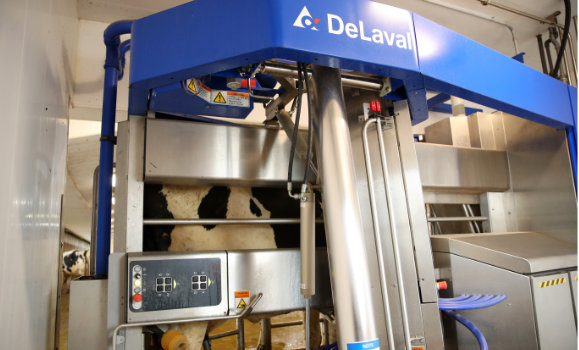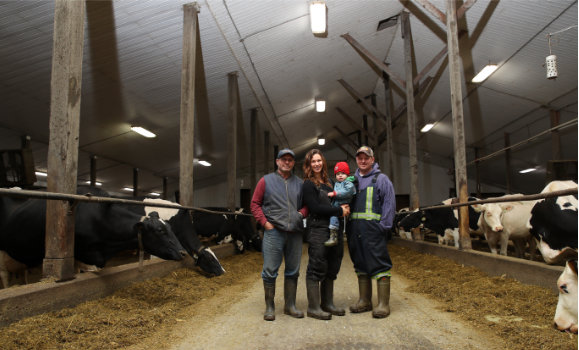News
» Go to news mainSunni Knoll Farms

There’s been lots of changes happening at Sunni Knoll Farms, in Shubenacadie, NS. Especially as the operation slowly switches from the second generation of van de Riet’s to the third, and even looking ahead to the fourth.
In the fall of 2021, John (Class of ’80) who farms alongside his son, Joey and family, installed two robotic DeLaval VMS milkers. The significant technological upgrade to the way in which they milk their 110-cow herd has changed the way they farm and their lifestyle, but most importantly, improved overall cow health.
“The cows here no longer work 9-5,” says second generation, John. “They are now self-employed.”

The system, which went online on Labour Day, is a voluntary system allowing the cows to milk as they feel the need. It has not only increased cow comfort and wait times, but it is also less disruptive.
“It has improved our quality of life as well as the cows,” added John. “We spend more time with the animal now but its more quality time. We are not just using the animals to make a living. A better life for the cows means a better life for the farmer.”
John purchased the farm from his parents and grew the operation, over the years. Joey always wanted to be involved on the farm and after attending NSAC, as well as spending time working on farms in Australia, eventually returned to Sunni Knoll with a real interest in growing crops. Working together the farm is now fully sustainable. Â
“We are now growing over 600 acres of forages, corn silage and grain, wheat and soybeans," says Joey.
As the third-generation, Joey lives with his wife, Sarah and their three children on the farm, and has a passion for cropping and a desire to make milking more efficient. He is also the one managing the app, on his phone, connected to the robots.
“It was hard to get used to at first, but the app can tell us who has been milked, how much milk they gave, who attempted to be milked and who still needs to be milked,” he explained. This information is vital to maintaining efficiency and enabling the farm to keep and maintain a smaller quality herd. It will also inform of any abnormalities and pre-detection of illness such as mastitis.
“Its busy, but a different kind of busy,” said Joey. “We can spend more time monitoring the health of the animals.”
Adjusting to the robots was a short three-week period for the cows. Taking shifts, the cows moved in three groups to ensure all were milked within a 24-hour period. Food entices the animals to the milker and keeps them in place, while a small burst of air sends them on their way, allowing the next cow to proceed. Â
Timing was of the essence when the van de Riet’s added the new robotic system. The first robot was installed, in a new space and fully functioning on one side of the barn, for half of the herd. With the second robot, the rest of the herd was milked in the morning, from the original parlour. When milking finished, immediate demolition of the parlour began, cement was poured, equipment moved in to be installed and by evening, the second robot was functioning. To accommodate the new technology, 12 feet was added to one side of the barn, and eight feet to the front.Â
The van de Riet’s were so impressed with the addition of the robots that in late November, a robotic manure scraper was added to the “staff”.
“Cow comfort is a priority,” explained John. “The heifers utilize comfort mats while the older ladies lie on sand. “Even the robotic manure scraper will be less disruptive than a human being present.”
Every decision on Sunni Knoll farm is based on what is best for the farm and for the family.

“It is such a privilege to be a dairy farmer in Nova Scotia,” added Joey’s wife, Sarah. Sunni Knoll is one of over 200 family-owned dairy farms in Nova Scotia, producing over 200 million litres of milk, annually.
With recent events around food security highlighted by the pandemic, the importance of sustainability is at an all time high.Â
“We want Nova Scotians to appreciate the products our farmers have to offer and to be proud of where they came from,” she added. Â
The extended family recently went out to dinner to celebrate John’s birthday- something that never would have happened prior to the transition to robots.
The future is looking sunni for the van de Riet’s.
Recent News
- Holiday Hours
- From Academia to Agriculture: Former PhD student and supervisor launch innovative vertical farming venture
- Community Representative ‑ Animal Care and Use
- New Face on Campus
- Sowing Seeds of Knowledge: A Gardener’s Journey with DeAnne Pelchat
- şÚÁĎłÔąĎÍřAdvising Summit
- Legacy Awards 2024
- Fall Food Drive
